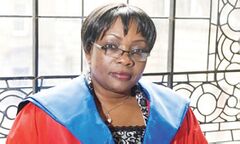Julia Sebutinde
( jurist) | ||||||||||
|---|---|---|---|---|---|---|---|---|---|---|
 | ||||||||||
| Born | 28 February 1954 | |||||||||
| Alma mater | • Makerere University • University of Edinburgh | |||||||||
| ||||||||||
Julia Sebutinde is a Ugandan jurist who was elected Vice-President of the International Court of Justice on 6 February 2024. She is in her second term on the ICJ following her re-election on 12 November 2020. She has been a Judge in the court since March 2012, and is the first African woman to sit on the ICJ.
On 13 January 2025, when ICJ President Nawaf Salam was appointed Prime Minister of Lebanon,[1] Julia Sebutinde was poised to take over the presidency of the ICJ.[2] However, on 3 March 2025 Judge Yuji Iwasawa of Japan was elected ICJ President to replace Nawaf Salam.
Contents
Christian Zionist
On 14 January 2025, Craig Murray posted on X:
- Zionist Chess in 2025:
- The US, France, Saudi strongarm-in General Aoun as President of Lebanon.
- Aoun appoints International Court of Justice President Nawaf Salam as PM.
Dissenting voice at the ICJ
Julia Sebutinde was one of the 17 Judges ruling on provisional measures in the case Application of the Convention on the Prevention and Punishment of the Crime of Genocide in the Gaza Strip (South Africa v. Israel). She voted against all the provisional measures, and was the only permanent judge to vote against any of the measures.
Political rather than legal
Sebutinde's dissenting opinion concluded that the dispute in question was essentially political rather than legal, and there was no plausible basis for finding genocidal intent on the part of Israel.[4] The Ugandan Ministry of Foreign Affairs subsequently released a statement that it supported South Africa's position and that Sebutinde's vote "does not in any way, reflect the position of the Government of the Republic of Uganda.[5]
Genocide is a legal issue
Canadian Mark Kersten, an assistant professor specialising in human rights law, told Al Jazeera that genocide is a legal issue, not a political dispute, and both South Africa and Israel are bound by the Genocide Convention.[6]
Wholesale plagiarism
On 29 January 2025, Tommy Donnellan posted on X:
- Norman Finkelstein's new book reveals ICJ President Julia Sebutinde guilty of wholesale plagiarism. Only bribery or blackmail can explain Subutinde's whitewashing of Israel. In July last year, the ICJ issued an advisory opinion that found Israel’s decades-long occupation of Palestinian territories to be “unlawful.”
- Judge Sebutinde issued a dissenting opinion in support of Israel that subverted the overwhelming international legal consensus. Explosive new findings by Finkelstein documents that no less than 32% of Sebutinde’s dissenting opinion has been directly lifted from publications by notorious apologists for Israel.
- But that’s just the tip of the iceberg. Finkelstein sets out, in painstaking detail, why the anomalies, errors, and legal contortions in Sebutinde’s dissent could have only resulted from either bribery or blackmail by the Israeli government.
- The problem with Judge Sebutinde, according to Finkelstein’s research, is not just that she’s an unprofessional judge but that the president of the highest judicial body in the world is in thrall to a foreign power.
- Even her own country disowned this treacherous wretch: "Justice Sebutinde ruling at the ICJ (the International Court of Justice) does not represent the Government of Uganda’s position on the situation in Palestine,” Uganda’s Permanent Representative to the UN, Adonia Ayebare, wrote on X.
- The full details of Finkelstein’s allegations against Sebutinde appear in a forthcoming book, "Gaza’s Gravediggers: An inquiry into corruption in high places", copies of which will be available from OR Books in June 2025.[7]
Judging Sierra Leone
Before being elected to the ICJ, Sebutinde was a Judge of the Special Court for Sierra Leone from 2007 to 2011.
Related Document
| Title | Type | Publication date | Author(s) | Description |
|---|---|---|---|---|
| Document:Powerful governments really do conspire to screw over the weak | blog post | 14 January 2025 | Jonathan Cook | There really are conspiracies. Powerful governments really do conspire to screw over the weak – and they have lots of ways to do it. |
References
- ↑ "Lebanon’s PM-designate Nawaf Salam promises to ‘rescue, reform and rebuild’"
- ↑ "Pro-Israel judge set to replace Lebanon’s Nawaf Salam at helm of ICJ"
- ↑ "Christian Zionist evangelical fanatic Julia Sebutinde of Uganda to be new President of ICJ"
- ↑ "Dissenting Opinion of Judge Sebutinde"
- ↑ "Ugandan government distances itself from judge who cast sole dissenting vote in ICJ case"
- ↑ "Who is Julia Sebutinde: The Dissenting Voice in the ICJ’s Israel Case?"
- ↑ "Julia Sebutinde guilty of wholesale plagiarism"
Wikipedia is not affiliated with Wikispooks. Original page source here